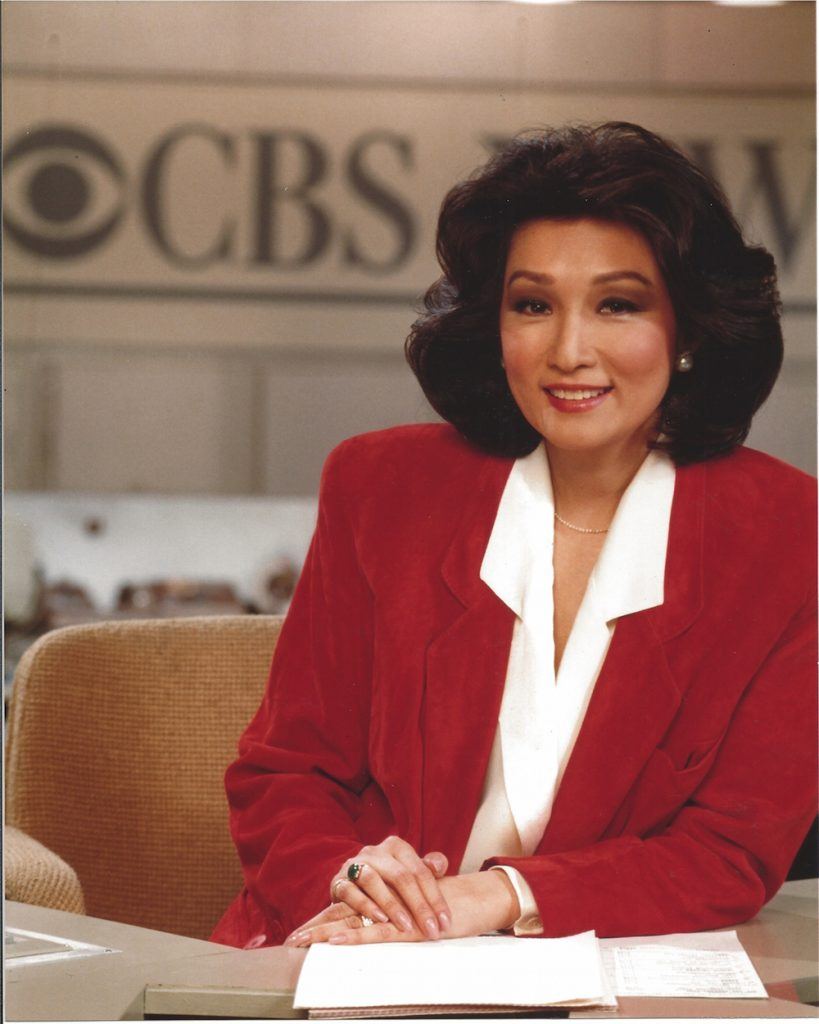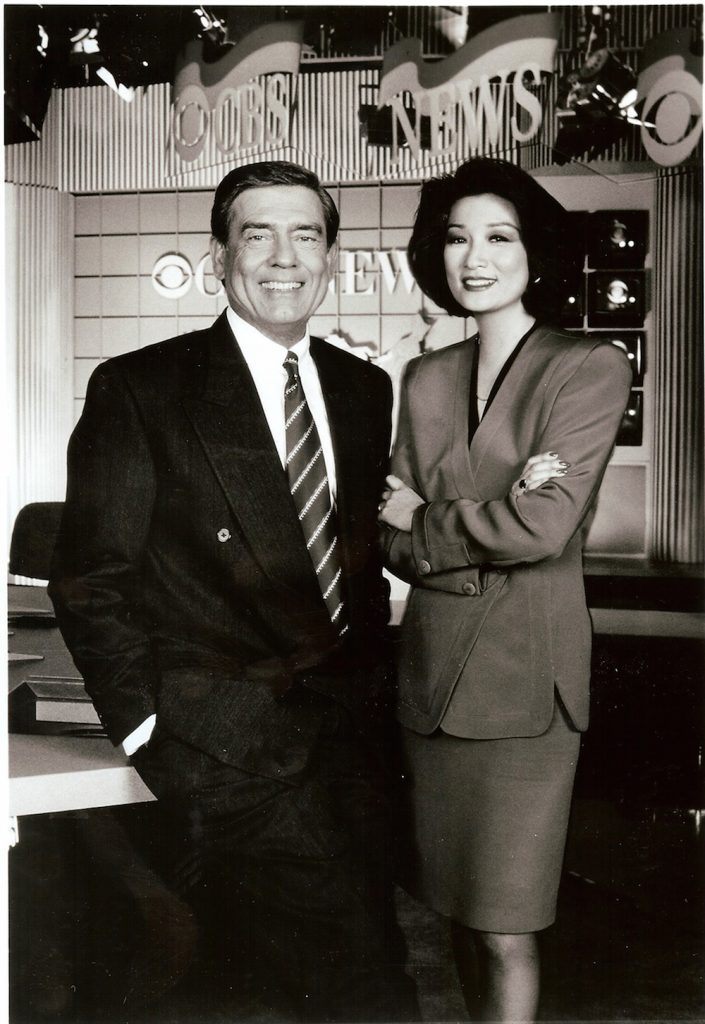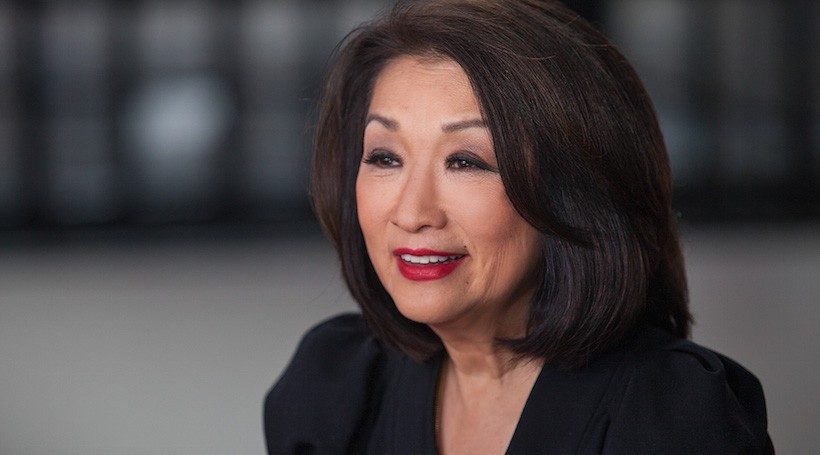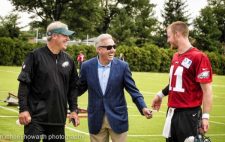Connie Chung is calm in the company of presidents and celebrities, and strong in the harsh light of criticism. She has been an anchor and reporter for every major American news network, including NBC, CBS, ABC, CNN and MSNBC. She has proved herself a relentless interviewer and a commanding presence behind a news desk.
She is an American cultural icon and an inspiration to generations of young women. She is a trailblazer; the first woman to co-anchor the “CBS Evening News,” and the first Chinese-American to anchor any major news program.


Chung joined CBS in 1989.
She is also a wife and mother, a remarkably warm and gracious person with a quick laugh and a quicker wit, and an honest-to-god Jersey girl.
Chung, 70, has been married to TV show host Maury Povich since 1984, and the two are longtime residents of Monmouth County.
“Connie Chung is probably the most dogged, persistent, honest, truth-seeking journalist television ever saw,” Povich says.
“I say that because when it all started, I was there. In 1970, in our hometown of Washington D.C., Connie was a relative unknown. She was the secretary assistant to the news director.”
“The first job in a TV newsroom that ever opens up is a weekend writing job. The job opens up, and Connie, ambitious and dogged as she is, goes to the news director and says, ‘I want that job.’ He says, ‘But you’re my assistant!’ She went on and on, and finally he said, ‘You can’t have the job unless you replace yourself.’ She walked out of the newsroom, across the street and into a bank, looked at the first woman teller and said, ‘Do you want to be in TV?’ walked her across the street, into the newsroom and said to the news director, ‘Now give me that job.’”
It was the late ’60s, and networks were under pressure to hire women. But being present in the newsroom, though, wasn’t the same as being accepted or respected.
“I think it was always hard for us as women, and I had this other thing going, in being Chinese,” Chung says.
“It was helpful in getting the job, but it all hurt in having the job. Everybody was a male. I mean everybody. The staff, the producers, the executive producers, the bureau chiefs, people we covered on Capitol Hill, the White House, the State Department – men. Some senator would say, ‘Well, young lady, what sweet little question do you have for me?’ and I would just stick it to him. I went through hell. A lot of discrimination, everything you can think of. In the beginning, all of us got ‘women-type’ stories. Like covering the first lady instead of the president.”
Early in her career, Chung got a tidbit of advice from a very unlikely source: then-President Richard Nixon, just as the Watergate scandal was coming to a head.
“I happened to run into the president,” Chung remembers. “He was standing in the driveway of the northwest gate, and the press came flooding out of the White House press room but Secret Service held them back. I had him all to myself, and I started asking all these questions about Watergate. He wouldn’t answer any of them. The only thing he said to me was, ‘Tell me something. How much do you make?’ I said, ‘Uh, $27,000 a year.’ He said, ‘You really should make more. Get them to pay you more.’”
In the years that followed, Chung would first rise to reporter, then to correspondent and finally, anchor. She became known for a gentle, conversational interview style interspersed with hard-hitting questions. She employed it on high-profile subjects like Congressman Gary Condit, whom Chung was the first to interview after the disappearance of Chandra Levy; Magic Johnson, just after he publicly announced he was HIV-positive, President Donald Trump in the weeks surrounding his highly publicized divorce from first wife, Ivana; and Newt Gingrich’s mother Kathleen, who felt so comfortable with Chung that she forgot to tread carefully.
She said her son thought Hillary Clinton was a bitch. On national television.
Chung’s persistent questioning, her gender and genetics made her the target of a great deal of criticism – some of it legitimate, and some just plain racist.


Dan Rather and Connie Chung co-anchored CBS Evening News from 1993 to 1995.
“I did hear racist remarks – ‘yellow journalism,’ ‘you slant the news’ – the whole nine yards. But I was always someone who would throw a joke back at somebody. I think it all just comes with the territory. There’s nothing any of us can do. When we’re in the spotlight, we put ourselves out there, and once we do we’re fair game. You can’t go home at night and cry about it. There’s no crying in news. The business I have been in requires sticking your neck out. You have to pursue the story. Dig, push and be bold.”
From the beginning, Chung was determined to make it big.
“My parents and my four older sisters were all born in China,” she says. “In China, all you want are sons. I always wanted to be the son my father never had, so I wanted to make the name Chung memorable. Walter Cronkite was my idol, and I always wanted to be him. I didn’t think that would ever happen.”
She thought wrong. In 1993, she joined Dan Rather as co-anchor of the “CBS Evening News.” It was the realization of a dream, but it was not to last.
“It was very clear from the beginning that Dan Rather did not want me there. You ask someone who’s been in the job forever to move over and make room for someone else? It’s a constant battle.”
Chung was eventually released from the job, but she is the kind of person who seems constantly able to see a silver lining. When she talks about that time in her life, it’s with utter joy.
“I lost my dream job. It was completely devastating,” she says. “But Maury and I had been trying to adopt for a while. The firing occurred on a Friday. The next day, we got a call that our son was coming. I had a baby when I was almost 50.”
In a career that has spanned nearly five decades, Chung has won three Emmys and a Peabody Award. She has become ingrained in pop culture, even making a cameo appearance in the new season of Netflix’s political drama “House of Cards.” Though she hasn’t hosted a news program since 2006, she is still called on by network hosts to offer occasional on-air commentary.
She is also still in the business of educating and inspiring a new generation of journalists – particularly women. At a screening of Amazon’s original series “Good Girls Revolt,” a fictionalized drama about a group of female journalists fighting discrimination in a 1960s newsroom based on a book by Chung’s sister-in-law Lynn Povich, Chung gave interviews through tears.
“There was a time I would gather information and have to give it to somebody else and not get the byline,” she says. “Or if I covered the White House, Capitol Hill, the Pentagon or State Department, I had to keep the seat warm for the big correspondent. It is better now, but women have not reached the level of parity yet because management is still white-male-oriented.”
“One thing women still need to remember is to sing your own praises the way the men do,” she says. “Don’t be afraid to say, ‘I am indispensable.’ I was indispensable. You’re welcome.”











